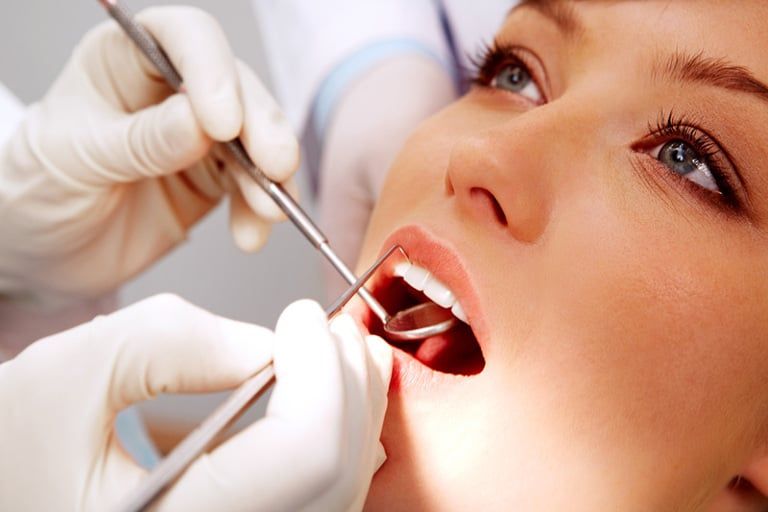NOBSCOTDENTAL CARE
REZA M. MADANI, DMD, FAGD
Gum Disease
Gum Disease

If you’re coping with periodontal disease, Dr. Madani and his team will help you regain optimal oral health.
Periodontal diseases are infections of the gums, which gradually lead to the destruction of the support of your natural teeth. These diseases affect more than 80% of Americans by the age of 45.
Dental plaque is the primary cause of gum disease. Bacteria found in plaque produce enzymes and toxins which injure the gums. Injured gums turn red, swell and bleed easily.
If this injury is prolonged, the gums separate from the teeth, causing pockets (spaces) to form.
Plaque can also harden into a rough, porous substance known as calculus (tartar).
Gum disease can occur both above and below the gum line. As the diseases progress, the supporting gum tissue and bone that holds teeth in place deteriorate.
If left untreated, this leads to tooth loss. Pain is usually not present until damage from this disease is very advanced.
Gum Disease: Surgical Treatments
Flap surgery is also known as "pocket reduction surgery." Dr. Madani creates tiny incisions in your gum so that he can pull back a section of gum tissue, exposing the roots for more effective scaling and root planing. Due to periodontitis often provoking bone deterioration, Dr. Madani may reshape the contour of the uncovered bone before the gum tissue is sutured back in place. After you heal, it's easier to clean these areas and support healthy gum tissue.
Gum Disease: Soft Tissue Grafts
Root exposure resulting from gingival tissue recession may pose multiple problems for patients:
- Undesirable Aesthetics
- Root Sensitivity
- Impaired Oral Hygiene
- Increased Caries Susceptibility
- Teeth May Become Loose
A gingival tissue graft will restore the proper gum tissue structure around the tooth. When a patient losses gum tissue, the gum line recedes. As a result, the patient may need to have some of the failed soft tissue augmented. Dr. Madani achieves this by transferring tissue from the roof of the mouth or utilizing tissue from a donor and attaching it to the affected location. In addition, grafting can diminish further gum recession, cover visible roots and provide the teeth a more esthetic appearance.
Gum Disease: Bone Grafting
Bone grafting is a procedure performed when gum disease has destroyed the bone anchoring a tooth root. The graft may be composed of small bits of the patient's bone, or the bone may be synthetic or donated. The bone graft helps prevent tooth loss by anchoring the tooth more securely. It also catalyzes the regeneration of natural bone.
Gum Disease: Guided Tissue Regeneration
Guided tissue regeneration allows the regrowth of bone that bacteria destroyed. Dr. Madani places a piece of biocompatible medical textile between surviving bone and the tooth. The material blocks unwanted tissue from accessing the healing zone, enabling the bone to grow anew.
Gum Disease: Tissue-Stimulating Proteins
Dr. Madani can artificially stimulate healthy bone and tissue growth by applying matrix protein gel to a diseased tooth root. The gel mimics the proteins observed in developing tooth enamel and spurs healthy bone and tissue growth.
Peri-Implant Disease
Gum disease affecting tissue around a dental implant can destroy the tissues and bone. Signs of peri-implant diseases are similar to symptoms of gum disease: red or tender gums around the implants or bleeding when brushing.
In the early stage (peri-implant mucositis), the symptoms are limited to inflammation around an implant, with no evidence of bone loss. At this early stage, Dr. Madani can treat the patient and likely restore the implant to health.
Once the problem advances and bone loss is involved (peri-implantitis), surgical treatment is usually necessary. Dr. Madani can remove the diseased tissue, rejuvenate compromised bone, and clean the area of tartar and bacteria buildup.
Use these tips to reduce or prevent gum disease:
- Brush teeth twice a day or, for maximum protection, after every meal.
- Use a soft toothbrush and replace it regularly.
- For maximum protection, use an electric toothbrush, as most do a better job removing plaque and tartar.
- Floss daily, yes daily! Get in the habit.
- Get regular professional dental cleanings on a schedule prescribed by your Dr. Madani.
Research has shown that gum disease can influence heart disease and other health conditions in negative ways. They suggest that gum disease could be a more serious factor in heart disease than smoking, cholesterol, hypertension, or age. One reason for this is that the bacteria found in diseased gums can come loose and move throughout the body. When this bacteria reaches arteries, it can cause arterial plaque to build up and harden, negatively affecting blood flow.
Gingivitis is an early stage of gum disease. Gingivitis develops as toxins, enzymes, and other plaque byproducts by irritating the gums, making them tender, swollen, and likely to bleed easily. Dr. Madani can usually stop early gum disease with proper minimal treatment and a patient's proper oral hygiene.
Moderate gum disease is when the tooth's bone tissue starts to deteriorate. Periodontitis occurs when plaque byproducts destroy the tissues that anchor your teeth in the bone. The gums deteriorate and begin detaching themselves from the teeth forming gum pockets, which allows more plaque to collect below the gum line. This causes the roots of the teeth to become susceptible to decay. Generally, patients notice an increase in sensitivity to hot and cold and to touch.
Severe periodontitis can damage large areas of gum tissue and bone. Teeth no longer have support as the disease continues to destroy the periodontal ligament and bone. As a result, teeth become loose and may even need extracting. In addition, symptoms cause difficulties in everyday chewing and biting habits. If advanced periodontal disease is left untreated, patients run the risk of other serious health problems.
If you suspect gum disease, see Dr. Madani ASAP.
Teeth that are suffering damage from gum disease will always be more sensitive to cold; and if you avoid cleaning them due to this sensitivity, it can only make the problem worse.
After dental treatment, some teeth may be more sensitive because this is their way of dealing with injury. Injuries to teeth such as cavities, gum infection and jaw clenching can damage the nerves in a tooth. The sensitivity should not last long after treatment as long as your teeth are kept clean; otherwise, the sensitivity is likely to get worse. If your teeth are ever extra sensitive, please consult with Dr. Madani as this could be a sign that you need a root canal or gum tissue treatment.
Our office provides smile makeovers to achieve the beautiful, natural look you seek. We can reshape your natural teeth to make them straighter or more youthful in appeal. Our offices is easily accessible and makes it convenient to those living in Framingham to get the care they deserve.
Make an Appointment
Call Us Today
(508) 877-0800
